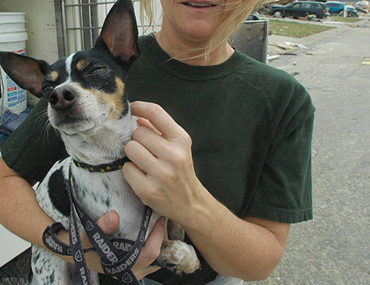
Dr. Justine Lee discusses Disaster Preparedness month and how you can prepare to care for your pet in the event of catastrophe. For more from Dr. Lee, find her on Facebook!
Did you know the month of September is National Preparedness Month? As an emergency critical care specialist, I like to use this time to make sure that pet owners are also well prepared for disasters or emergencies. The general rule is to be prepared to go three days without food sources, water, electricity or access to stores or local services.
We’ll focus this blog just for preparations for your pet. For more information on what you need to supply for yourself, check out some great resources from FEMA or the American Red Cross on human survival kits.
During Hurricane Katrina, many pets were sadly abandoned. If you end up evacuating your home, don’t leave your pets behind, as the likelihood they’ll survive or reconnect with you afterwards is low (especially without a collar and microchip)!
Keep in mind that if you are going to a public shelter during a disaster, often animals are not allowed inside. When in doubt, survey pet-friendly hotels in advance so you know you have a place to go to with your pets. Also, make sure you have shelter alternatives in advance – friends, loved ones, colleagues, etc. who are willing to host you and your pet(s) in case of an evaluation or emergency.
[Check out 5 Things You Probably Don't Know About Disaster Preparedness for Pets.]
Making an animal emergency supply preparedness kit for your pet is simple: start with a brightly colored backpack. (I like to make sure it’s a red or a bright color in case you need to use it as a signal for help.). Also, in case of an emergency, you can easily find it in your closet or basement and “ grab and go.”
Some must-haves to include in your animal emergency backpack include:
- A luggage tag on your backpack – that way, your name, address, email and multiple emergency contact numbers are available.
- A leash, harness, cat carrier (a pillow case or cardboard box will work in a pinch) and extra collar, appropriately labeled with pet identification tags with your contact information.
- A copy of your pet’s latest health certificate, vaccine records, and medical records in a sealed, watertight plastic bag.
- A few extra doses of heartworm preventative pills and flea/tick preventative medication
- At least 2 weeks worth of your pet’s medication
- Extra plastic bags (poop bags)
- A basic first aid kit
- A small flashlight with extra batteries
- An extra plastic food bowl
- A Gulpy water dispenser (so you can provide water to your dog at any time)
- A new, sealed bag of treats (that can help entice your pet to eat in times of stress)
- A few cans of dog or cat food and bottles of water: Pop-off lid canned food is great to keep in your pet emergency kit as it doesn’t require a can opener. It allows you feed your pet during a disaster. I typically don’t recommend storing dry kibble (which can go rancid after several years) – alternatively, you can use an unused, unopened dry pet food bag.
- A quart size bag full of kitty litter: Again, you never know when you have to evacuate quickly with your pet. Keeping a bag of kitty litter in your first aid kit or in your cat carrier is imperative in case you’re on the run.
- Kitty litter pan
The last few tips?
- Always pre-program your cell phone with the phone numbers to your veterinarian, your emergency veterinarian, and a family member’s emergency contact information. Better yet, print this out and store these phone numbers in your plastic, waterproof bag. That way, if your cell phone dies, you still have access to this information.
- Always pre-program the address of your veterinarian’s office and emergency veterinarian’s clinic into your car’s GPS, so you can get there immediately in case of emergency.
When in doubt, take the time to create a disaster preparedness kit for your pet. That way you can make sure your four-legged friend stays safe during an emergency or disaster also.
If you have any questions or concerns, you should always visit or call your veterinarian – they are your best resource to ensure the health and well-being of your pets.
